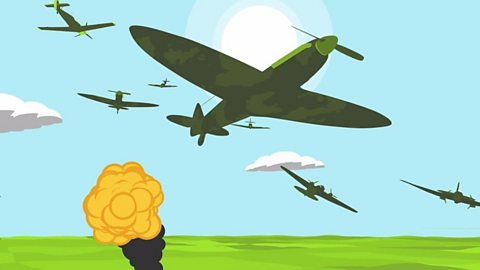The greatest Briton?
On 8 May 1945 Winston Churchill stood on a Whitehall balcony and addressed the excited crowd below. "In all our long history," he said, "we have never seen a greater day than this." Churchill had stood against Hitler and won – the day was his.
Half a century on from his death, Churchill is considered by many to be the greatest Briton. But his legacy didn't always look so secure. From trouble at school to errors in office, Churchill's path to greatness was often a rocky one.
1874-1893
Birth and childhood
Winston Leonard Spencer-Churchill was born at Blenheim Palace, the seat of his grandfather the 7th Duke of Marlborough, on 30 November 1874.
His father, Lord Randolph, was a prominent Conservative politician and his mother the daughter of a New York financier. Young Winston saw neither of them as often as he would have liked. At 13 he scraped into the lowest class at Harrow. Randolph, believing that his son was academically unsuited for politics or law, had him placed in the army class.
What was Churchill's childhood like? Richard Dimbleby explains. (Clip from 1965 Churchill obituary broadcast by the ´óĎó´«Ă˝).
1874-1893 Birth and childhood:
His birthplace was in the Palace of Blenheim at Woodstock built by the nation for his great ancestor, the first Duke of Marlborough. It was the grandest country house in England. It boasted an organ room that could have served as a cathedral. It celebrated military triumph; but away from the state apartments and tapestried saloons, Winston was born in a Victorian room on the ground floor. His father, Lord Randolph Churchill was one of the most brilliant politicians of his age. He was Chancellor of the Exchequer and Leader of the House of Commons. He fought to modernise the Tory Party. He failed at the last to achieve his political ambitions and he died still comparatively young, a deeply disappointed man. His mother Jenny Churchill was an American by birth. She was both lively and beautiful and men used to say she had the most musical voice they had ever heard.
His first appearance in the press was typically ahead of his time. But although he was born to especial privilege the story of his childhood reads no differently from that of other little boys of prosperous Victorian families. He went to a private school where he did not do very well. He went to Harrow where he in no way distinguished himself except for a certain impatience of authority. He had a lifelong friend in Sir Shane Leslie:
Sir Shane Leslie:
I believe I must be only person now alive who barely remembers Sir Winston as a school boy. I have a photograph of a group taken in Brighton in 1889 – Sir Winston’s mother and my mother and their third sister showing all the cousins. And of course, our great employment there was being drilled in Winston’s army. There was some eight of us and the gardeners’ boys. It was an army that never changed its commander and for the ranks there was no promotion.
1893-1895
Sandhurst
Churchill enrolled at Sandhurst as an officer cadet in September 1893, though it took him three attempts to pass the entrance exam.
He took to Sandhurst well and his efforts were winning his father’s respect. But before the relationship could blossom Lord Randolph died, aged 45. This had a profound impact on Churchill: it convinced him of the need to make his mark early in life. His first public address came in unexpected surroundings – the Empire Theatre in Leicester Square. Incensed by the newly-erected screens restricting access to the bars, Churchill led fellow cadets to riot before delivering an impromptu speech.
Watch childhood friend Sir Shane Leslie describe how Churchill came of age at Sandhurst. (Clip from 1965 Churchill obituary broadcast by the ´óĎó´«Ă˝).
1895-1899
Imperial adventures
Churchill obtained his commission as a cavalry officer in the 4th (Queen’s Own) Hussars in February 1895.
Also employed as a war reporter, he spent his 21st birthday in Cuba, acquiring two lifelong habits – siestas and Havana cigars. The following year Churchill sailed with his regiment for India and in 1898 fought in Sudan. Already determined to pursue a career in politics he hungrily followed political news from home. Concerned by his lack of university education, he read voraciously, even poring over old parliamentary debates and making his own imaginary contributions.
See Churchill's imperial adventures in the 'high, heady days of Empire' (Clip from 1965 Churchill obituary broadcast by the ´óĎó´«Ă˝).
1899
Fame and daring
The Boer Republics declared war on Britain on 11 October 1899 and Churchill travelled to South Africa to cover the conflict as a war correspondent.
On 15 November, he was on an armoured train in Natal when it was ambushed. He was captured and imprisoned in Pretoria. On 12 December, when the guards' backs were turned, he took his opportunity to escape and clambered over a prison wall into the night. He jumped on a passing train, hiding among sacks, before alighting and enlisting the help of a Transvaal Collieries manager. Churchill arrived in Durban a hero. Back in Britain, stories of his exploits made him famous.
Richard Dimbleby on Churchill's daring escape from imprisonment (Clip from 1965 Churchill obituary broadcast by the ´óĎó´«Ă˝).
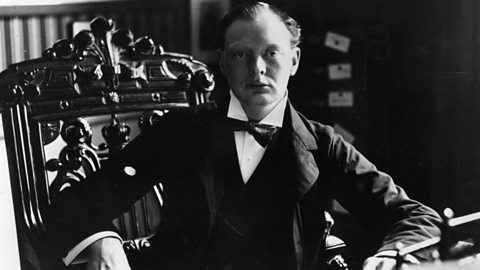
1900
Election to Parliament
Churchill's new-found fame allowed him to further his political ambitions. At the 1900 General Election he became MP for Oldham.
Churchill delivered his first speech in Parliament in 1901. He had a lisp and overcame this with diligent preparation. After drying up alarmingly in the House of Commons in 1904, he always used detailed notes when he spoke. Churchill was unafraid to disagree with his party chiefs. Together with his friend, Lord Hugh Cecil, he organised a group of young Tory MPs who specialised in harassing their own party leaders – the 'Hughligans'.

1904
Crossing the floor
From May 1903 Churchill found himself further at odds with much of his own Conservative Party when he objected to proposed tariff reforms.
Self-confident and supremely assured of his own views, he took a stand against influential politician Joseph Chamberlain. He left the Conservative Party and took a seat on the Liberal benches, flying the flag for free trade. The Conservatives, he said, had abandoned their principles – and he attacked them ferociously. The move paid off. In 1908 he became the youngest cabinet minister since 1866 and the social reforms he pioneered with David Lloyd-George laid the foundations of the welfare state.
Richard Dimbleby explains why Churchill defected to the Liberals. (Clip from 1965 Churchill obituary broadcast by the ´óĎó´«Ă˝).
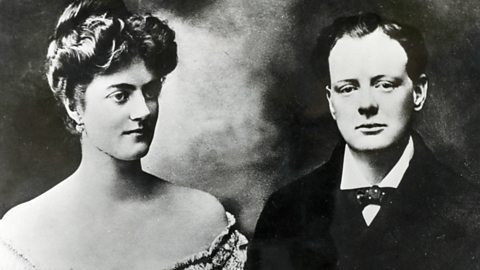
1908
My darling Clementine
Churchill first met Clementine Hozier, who at 19 had recently entered the London social scene, at a ball in 1904.
But, socially awkward and then in love with another woman, he made a poor impression. Despite his successful career, when he met her again at a dinner in March 1908 he had proposed to – and been rejected by – three women. But his luck changed. Later that year, sheltering from the rain together in the Temple of Diana overlooking the lake at Blenheim Palace, Churchill proposed. Clementine accepted and they married in Westminster on 12 September 1908, going on to have five children.

1914
Battle stations
His political career was thriving. In 1911 he became First Lord of the Admiralty and oversaw rapid expansion in the naval arms race with Germany.
After the assassination of Archduke Franz Ferdinand in Sarajevo in June 1914, Europe was brought to the brink of war. As war drew closer, Churchill was determined that Britain must play her part. The fleet was ordered to battle stations and in crucial cabinet discussions, he argued strongly against wavering colleagues like David Lloyd George. Germany invaded Belgium on 4 August 1914, by 11pm Britain was at war.
See how Churchill prepared the British fleet. (Clip from 1965 Churchill obituary broadcast by the ´óĎó´«Ă˝).
1915
Resignation and disgrace
Churchill was heavily criticised for presiding over a number of British naval failures in the early months of the war.
High profile losses put Churchill firmly in the spotlight. In September 1914, three British cruisers were sunk in the North Sea. In December, German battleships shelled Scarborough. Churchill sought to land a decisive blow. His plan was to sail through the Dardanelles and force Germany's ally, Turkey, out of the war. An attack was launched on 18 March 1915. Troops landed on Gallipoli on 25 April. It was a disaster. Pinned down, losses were heavy and Churchill forced to resign in disgrace.
Watch Richard Dimbleby on Churchill's role in the Gallipoli disaster. (Clip from 1965 Churchill obituary broadcast by the ´óĎó´«Ă˝).
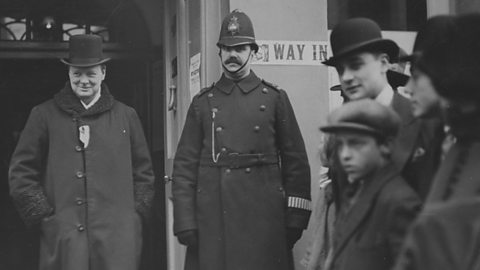
1924
A Conservative again
By the end of the First World War, Churchill had scrambled back into office but Gallipoli was still a stain on his reputation.
His political affinities now lay increasingly to the right of his Liberal colleagues. When his chief detractor Andrew Bonar Law was replaced by Stanley Baldwin as Conservative leader, Churchill seized the opportunity. Prepared to follow his own mind, in the 1924 General Election Churchill stood for the Conservatives in Epping and won. He was offered the post of Chancellor once held by his father.

1926
Another setback
Churchill restored the gold standard – a system of currency valuation which fixed the value of the pound to a set quantity of gold.
The move was disastrous. An overvalued pound saw demand in export markets collapse and industry suffered. In 1926, over a million miners were locked out of their mines and prevented from working following a dispute with employers who wanted them to work more hours for less money. The Trades Union Congress called a general strike and the country ground to a halt. In the 1929 General Election, Labour won and Churchill was out of office once again.
Watch Richard Dimbleby on Churchill's attitude to the general strike. (Clip from 1965 Churchill obituary broadcast by the ´óĎó´«Ă˝).
1929-1939
The wilderness years
Churchill became an increasingly marginalised voice as his views were out of step with the time.
His opposition to giving Britain's Indian Empire greater powers of self-governance – exacerbated by his support for King Edward VIII in the 1936 abdication crisis – left him sidelined by both Baldwin and then Neville Chamberlain. His dire warnings about the rise of Hitler and the Nazis went unheeded. In September 1938 Chamberlain returned from Munich proclaiming 'peace for our time' after sacrificing Czechoslovakia to Hitler. Churchill was furious.
Why were Churchill's warnings about the Nazis ignored? Richard Dimbleby explains. (Clip from 1965 Churchill obituary broadcast by the ´óĎó´«Ă˝).
1939
In time of need
Hitler invaded Poland on 1 September 1939. By the 3rd, Britain was once again at war with Germany.
Churchill was immediately recalled from his political exile, again becoming First Lord of the Admiralty. By May 1940, Britain and her allies were losing the war. In the face of the Nazis' relentless march across Europe, Chamberlain bowed to pressure and resigned as Prime Minister. When Lord Halifax – the man fancied to assume the Premiership – refused the role, Churchill was the only credible alternative to lead. He also took the post of Minster of Defence and responsibility for the war effort.
See how war elevated Churchill to Prime Minister. (Clip from 1965 Churchill obituary broadcast by the ´óĎó´«Ă˝).
1940
We shall never surrender
The war was going badly and Lord Halifax, the foreign secretary, urged Churchill to negotiate peace terms with Hitler.
The British Expeditionary Force was facing encirclement in France. Churchill, though, was resolute and overruled Halifax. Hundreds of thousands of allied soldiers were evacuated from Dunkirk. France surrendered. On 22 June, French leader Marshal PĂ©tain signed an armistice with Germany. France would be occupied, forced to pay for the German invasion and her army disbanded. Now standing alone, Churchill's speeches stirred Britain to continue fighting until the US and USSR joined the war in 1941.
See how the fate of the world rested on the Battle of Britain and Churchill's 'finest hour'. (Clip from 1965 Churchill obituary broadcast by the ´óĎó´«Ă˝).
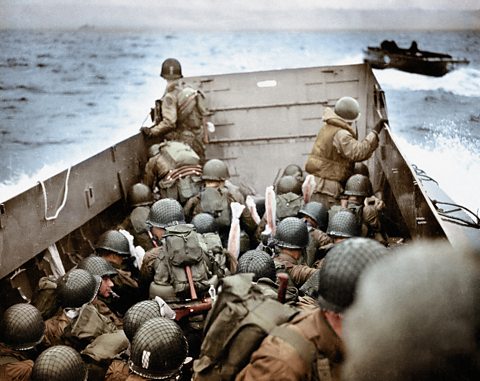
1944
Turning the tide
As the war progressed, Churchill sought to delay the invasion of Nazi-occupied France for as long as possible, fearful of a second Gallipoli.
But, as pressure from the US and USSR grew, the date was set. On 6 June 1944, US, British and Canadian forces invaded Nazi-occupied France. D-Day had arrived. More than 150,000 troops were landed on French soil in the biggest ever seaborne invasion. At midday, Churchill was able to report the success of the landings to the House of Commons.

1945
Victory and defeat
On 7 May 1945, Germany surrendered. Though Japan would continue fighting until September, the Allies had won. Churchill had led the nation to victory.
But in the July General Election the Conservatives led by Churchill were roundly defeated by Labour. Clement Attlee was the new Prime Minister. After two world wars in little more than a generation, Labour policies to raise employment, establish the NHS and nationalise key industries resonated with an electorate voting for change. After his wife commented that the result may be a blessing in disguise, Churchill retorted: "At the moment it seems quite effectively disguised."
Richard Dimbleby explains how Churchill could lose the 1945 General Election. (Clip from 1965 Churchill obituary broadcast by the ´óĎó´«Ă˝).
1945-1951
Writing history
Despite his wife's protestations, Churchill was determined to remain as Conservative leader.
But it was a role he neglected somewhat, staying away from the House of Commons for long periods. Broadly in accord with Attlee's foreign and defence policies, he busied himself with proposals for European unity and a six volume history of the Second World War. In Joseph Stalin's Soviet Union, Churchill also spotted a new enemy. In March 1946, he delivered one of the opening volleys of the Cold War when he denounced Soviet expansion into Eastern Europe.
1951-1955
Return to Downing Street
On 26 October 1951, little more than four weeks shy of his 77th birthday, Churchill led the Conservatives to electoral victory once again.
He was, however, an ailing force. In 1953 Churchill was left partially paralysed after suffering a stroke which government officials and the press colluded in concealing. He had repeatedly pressed for discussions with the USSR but, even after Stalin's death, failed to convince the US of the need for a common approach. Churchill authorised Britain's nuclear weapons programme in 1954 and his final major speech to the House of Commons in 1955 tackled the threat of nuclear destruction.
1955-1965
Retirement
Throughout his life Churchill had fought against depression, his 'black dog'. After his resignation on 5 April 1955, it was a battle he began to lose.
He remained an MP until 1964 but for those last nine years never again spoke in the House of Commons. He spent much of his time at his home, Chartwell, or on holiday in the French Riviera. As one daughter, Sarah, fell into alcoholism another, Diana, committed suicide. His relationship with his son, Randolph, was turbulent. Churchill's physical health was also failing, and he suffered a series of further strokes. Planning began for his own state funeral – termed Operation Hope Not.
See Churchill greet the Royal Family on the eve of his resignation. (Clip from 1965 Churchill obituary broadcast by the ´óĎó´«Ă˝).
1965
The nation's farewell
On 24 January 1965, 70 years to the day since the death of his father, Churchill died. He was 90 years old.
World leaders and dignitaries gathered for his funeral service on 30 January. Huge silent crowds lined the streets to pay their respects as his coffin travelled slowly through central London to St Paul's Cathedral. Millions more around the world watched as the ´óĎó´«Ă˝ broadcast the events live. Churchill was laid to rest in Oxfordshire, close to his family's ancestral seat at Blenheim Palace, where he had been born 90 years before.
Watch coverage of Winston Churchill's state funeral, broadcast by the ´óĎó´«Ă˝ in 1965.
Learn more about this topic:
WW2: Did Winston's words win the war? document
Winston Churchill is revered as one of history's great orators, but just how crucial a role did his speeches play in winning World War Two?
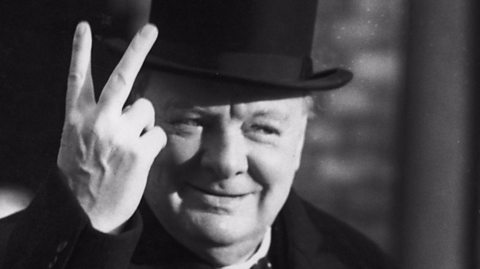
Adolf Hitler: Man and monster. document
Few names from history inspire such immediate and emphatic revulsion as that of Adolf Hitler. His hands are stained with the blood of millions killed in the devastation of World War Two and the horror of the Holocaust. Find out about Hitler's life and discover the road that led to destruction.
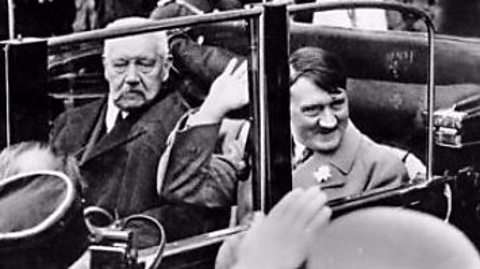
WW2: What was the secret to winning the Battle of Britain? document
The Battle of Britain was a pivotal moment in World War Two, when the country stood alone against Hitler's seemingly unstoppable military power. This guide explores this historic period through text and infographics.
